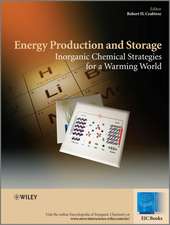Computer Simulation of Polymeric Materials: Applications of the OCTA System
Editat de Japan Association for Chemical Innovationen Limba Engleză Paperback – 12 iun 2018
| Toate formatele și edițiile | Preț | Express |
|---|---|---|
| Paperback (1) | 793.25 lei 38-45 zile | |
| Springer Nature Singapore – 12 iun 2018 | 793.25 lei 38-45 zile | |
| Hardback (1) | 961.86 lei 3-5 săpt. | |
| Springer Nature Singapore – 9 aug 2016 | 961.86 lei 3-5 săpt. |
Preț: 793.25 lei
Preț vechi: 1043.75 lei
-24% Nou
Puncte Express: 1190
Preț estimativ în valută:
151.78€ • 158.48$ • 125.62£
151.78€ • 158.48$ • 125.62£
Carte tipărită la comandă
Livrare economică 31 martie-07 aprilie
Preluare comenzi: 021 569.72.76
Specificații
ISBN-13: 9789811092596
ISBN-10: 9811092591
Pagini: 400
Ilustrații: IX, 400 p. 258 illus., 194 illus. in color.
Dimensiuni: 155 x 235 mm
Ediția:Softcover reprint of the original 1st ed. 2016
Editura: Springer Nature Singapore
Colecția Springer
Locul publicării:Singapore, Singapore
ISBN-10: 9811092591
Pagini: 400
Ilustrații: IX, 400 p. 258 illus., 194 illus. in color.
Dimensiuni: 155 x 235 mm
Ediția:Softcover reprint of the original 1st ed. 2016
Editura: Springer Nature Singapore
Colecția Springer
Locul publicării:Singapore, Singapore
Cuprins
Expected Target of Polymer Simulation.- Coarse-Grained Simulation.- Overview of OCTA.- COGNAC: Coarse-grained Molecular Dynamics Simulator.- SUSHI: Density Functional Theory Simulator.- PASTA & NAPLES: Rheology Simulator.- MUFFIN: Multi Phase Simulator.- KAPSEL: Colloidal Dispersion Simulator.- Melt Viscoelasticity.- Crystallization of Polymers.- Polymer Blends: Bulk Property.- Polymer Blends: Interfacial Strength.- Composites: Morphology.- Composites: Interfacial Strength.- Cross-linked Rubber.- Thermoplastic Elastomers.- Filler-filled Rubbers.- Structures of the Surface and Interface.- Glass Transition at the Surface and Interface.- Evaporation from Polymer Solution.- Crystallization in Thin Films of n-alkanes.- Improvement of Adhesive Properties utilizing Segregation of Oligomers and Investigation of Its Mechanism by SUSHI Simulation.- Adsorption of Polyelectrolytes.- Adsorbed Structures and Surface Forces.- Analysis of Relaxation Mechanism of Thread-like Micelle Solution.- Vesicle Formation.- Electrolyte Membranes.- Orientation Birefringence.- Lithography.
Notă biografică
The Japan Association for Chemical Innovation (JACI), a public interest incorporated association, is composed of members from the chemical industry, user industries, academia, and leading national research institutions in Japan. This public interest corporation carries out activities with the aim of promoting various projects with highly public nature concerning chemical technology innovation.
Textul de pe ultima copertă
This book is the first to introduce a mesoscale polymer simulation system called OCTA. With its name derived from "Open Computational Tool for Advanced material technology," OCTA is a unique software product, available without charge, that was developed in a project funded by Japanese government. OCTA contains a series of simulation programs focused on mesoscale simulation of the soft matter COGNAC, SUSHI, PASTA, NAPLES, MUFFIN, and KAPSEL. When mesoscale polymer simulation is performed, one may encounter many difficulties that this book will help to overcome. The book not only introduces the theoretical background and functions of each simulation engine, it also provides many examples of the practical applications of the OCTA system. Those examples include predicting mechanical properties of plastic and rubber, morphology formation of polymer blends and composites, the micelle structure of surfactants, and optical properties of polymer films. This volume is strongly recommended as a valuable resource for both academic and industrial researchers who work in polymer simulation.
Caracteristici
Is the first published sourcebook on the OCTA system Introduces many practical examples from researchers in both academia and industry Includes detailed processes and tips on simulation that readers can apply to their own research projects









